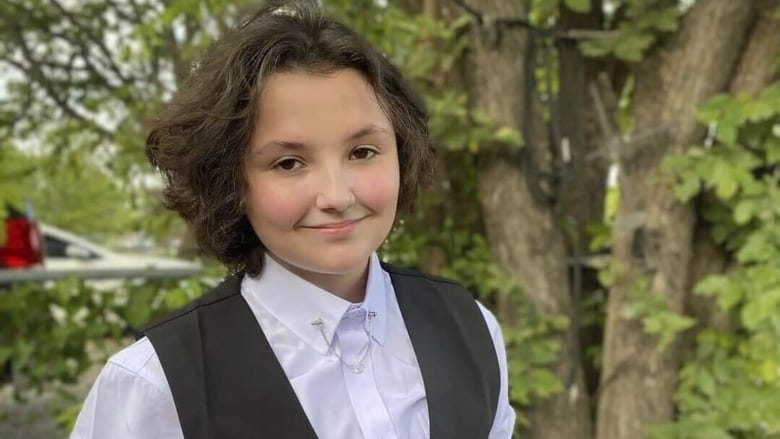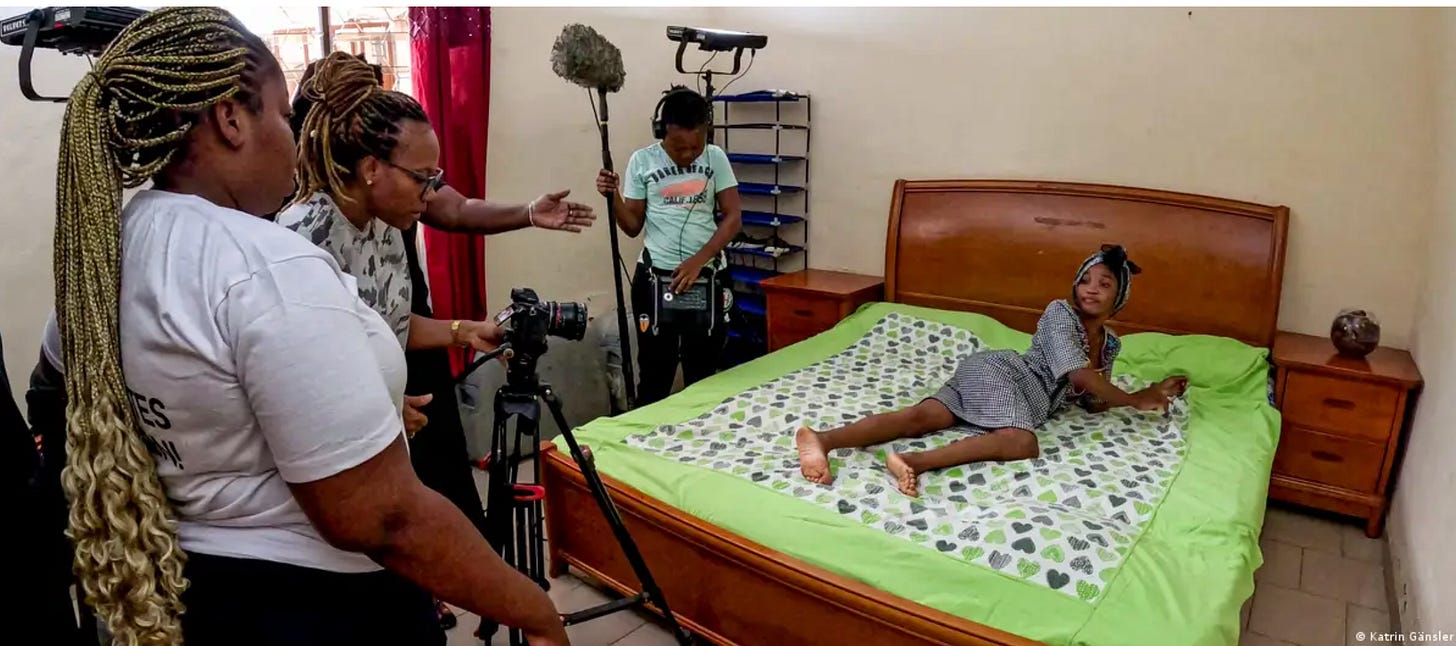Global Roundup: 2-spirit & Indigiqueer Communities Mourn Nex Benedict, Queer Palestinian Artist, Saudi Arabia Women’s Advocates, African Women Filmmakers, Kenya Anti-FGM Activist
Curated by FG Contributor Samiha Hossain
Nex Benedict poses outside the family's home in Owasso, Okla., in December 2023. (Sue Benedict/The Associated Press)
Members of the two-spirit, Indigiqueer, and Indigenous transgender communities are mourning the death earlier this month of a non-binary 16-year-old teen in Oklahoma. Nex Benedict died the day after a violent confrontation in a high school bathroom in Owasso, near Tulsa.
Benedict's mother is enrolled with the Choctaw Nation of Oklahoma and the school where the incident took place is located within the Cherokee Nation reservation. Benedict's family said Benedict experienced bullying from their classmates due to their gender identity. The story has sparked cross-border reaction from 2SLGBTQ+ community members in Canada, reflecting on their own experiences as well as the current climate for Indigenous youth.
Many of us are in mourning. This was a young child that very few of us were directly connected to but they're still a relative, they are still a two-spirit relative in the way that our community sees things. Something that affects one of us affects all of us. A young two-spirit child, one of our relations, died … and it's a direct result of transphobia. -Jade Lacosse, Anishinaabe and adopted Tlingit two-spirit trans woman in Whitehorse
Kish, whose mother is from Six Nations of the Grand River in Ontario, said what happened to Nex hits close to home. Kish said that she received several messages after posting Nex's story on social media, some from other Indigenous people denying the existence of two-spirit people currently and pre-colonially.
Lacie Burning, a Mohawk interdisciplinary artist from Six Nations of the Grand River, said that the incident happening on reserve is the result of colonial violence.
It's just a continuation of the lateral violence that every one of our community members has also gone through. If you're not cis-hetero, then you're kind of always just going to be the odd one out. -Lacie Burning
As new details continue to emerge about Benedict’s tragic death and its investigation, mourners are criticizing the school’s response, condemning Republican-sponsored, anti-trans state policies, and looking for the truth amid numerous conflicting reports that sprung up following the attack. After the family’s GoFundMe (which used Nex’s deadname) for funeral expenses passed its $15,000 goal, Benedict’s mother wrote in an update that excess funds will be donated to “other children dealing with the right to be who they feel they are,” in Nex’s name.
The son of a famous Palestinian resistance fighter, artist Hamza Abuhamdia opens up on Vice about juggling the multiple facets of his identity. Hamza is a queer multidisciplinary artist and architect, living in Paris since 2016. His father, Maysara Abuhamdia, a famous Palestinian resistance fighter, was imprisoned twice by the Israeli army before being banished to Jordan, where Hamza was born and raised.
Today, I feel the need to remind people that I am Palestinian, I am queer, and I exist. -Hamza Abuhamdia
Hamza discusses his life in Amman, Jordan, and his relationship with his family. When he learned he was Palestinian at the age of four or five, he describes not wanting to associate with that identity. Hamza’s father died in an Israeli prison from untreated cancer – he says his father’s story inspires him today.
According to Hamza, the history of the rainbow flag “remains Western, white, and capitalist.” He says he doesn’t think it’s easy to be queer in Palestine due to several factors, however, he cannot speak from lived experience as he has never lived in Palestine. Acknowledging his privilege, suffering, resources, and mental health has helped him find his place as an activist in the Palestinian struggle. Hamza holds on to hope for Palestine as he sees the world becoming more aware.
But first, you have to ask yourself, ‘What will make me feel worse: talking about Palestine, human rights, feminism, or bottling up all my feelings?’ I don't want to follow those who’ve chosen the second solution. -Hamza Abuhamdia
Undated photo of Saudi rights defender Manahel al-Otaibi. Al-Otaibi is currently forcibly disappeared and facing charges in Saudi's top terror court for calling for more freedoms for women.
Amnesty International calls on Saudi Arabia to release 29-year-old fitness instructor, human rights defender and blogger Manahel al-Otaibi who has been forcibly disappeared since November 2023. Prison and other officials have cut off all of her contact with her family and the outside world and refused to provide her family with information about her whereabouts and wellbeing despite their repeated inquiries.
Manahel al-Otaibi has been in detention for a year and a half and has spent the last year awaiting her trial before Saudi Arabia’s notorious counterterrorism court, the Specialized Criminal Court, on cybercrime law charges. She is being tried for posting photos of herself on Snapchat in a mall without the abaya and for social media posts in support of women’s rights and calling for the removal of Saudi Arabia’s repressive male guardianship laws.
It is outrageous that Saudi Arabia’s authorities are punishing Manahel al-Otaibi for expressing her support for women’s rights online and for defying traditional dress codes. She should never have been arrested in the first place, let alone subjected to enforced disappearance and prosecution. Her case shatters any illusion that Saudi Arabia’s authorities are serious about genuine human rights reform. -Bissan Fakih, Amnesty International’s Campaigner on Saudi Arabia
The charges against Manahel al-Otaibi include “publishing and spreading content that contains committing public sins and inciting individuals and girls in society to renounce religious principles.” The Riyadh Criminal Court document also lists other charges against Manahel al-Otaibi based on social media content that prosecutors deemed was “opposed to regulations and laws that relate to women” referring to posts in which she used the “EndMaleGuardianship” hashtag.
Both of Manahel al-Otaibi’s sisters have also faced investigation for criminal charges for campaigning for women’s rights. The court document reviewed by Amnesty International, states that a separate order would be issued for Fawzia al-Otaibi’s arrest. She is currently in the United Kingdom and cannot return to Saudi Arabia for fear of arrest and prosecution. Their other sister, Mariam al-Otaibi, is a prominent advocate against male guardianship in the Kingdom. She was previously charged and detained in 2017 for 104 days for her women’s rights activism and is currently subjected to a travel ban and restrictions on her speech.
34-year-old Wendo Aszed believes the subject of female genital mutilation (FGM) and other forms of sexual gender based violence (SGBV) should never fade from the national conversation in Kenya. For 12 years she has been fighting the ant-FGM battle, traversing far-flung areas in Nakuru and Baringo Counties.
It all began in 2009 when engaged as a social worker at a humanitarian agency, Aszed came face to face with the horror that girls, some as young as 9 years, faced as they were subjected to FGM. The sight of many young girls being subjected to FGM, forced into child marriages, and burdened with the responsibilities of motherhood before they matured moved her to act.
Through her Dandelion Africa NGO, Aszed has empowered and helped to rescue tens of girls from the cut. The NGO also empowers boys to drop harmful cultural attitudes and beliefs around gender roles and norms and appreciate and protect their sisters from the cut. Her calling has taken her to the most secluded villages, and in the process is playing a major role in the reduction of FGM cases in the surrounding counties. Public barazas organised by chiefs and village elders, community discussions, radio talk shows, and religious institutions have helped Dandelion Africa reach a large audience, particularly men who hold sway on cultural matters.
In the traditions of the communities that practice FGM it is taboo to talk about this, let alone using replicas of the female reproductive organs, thus sometimes we face objections. -Wendo Aszed
Aszed believes that the anti-FGM war would only be won by ensuring the media continues to highlight FGM issues and also involve survivors in the fight.
For years, this narrative has ignored the survivors who can tell the full story. These survivors could be even career women or even political leaders who went through the cut and who still carry the shame of being circumcised. -Wendo Aszed
Image: Katrin Gänsler
Glele has succeeded in inviting women filmmakers, directors and actors from all over Africa, organizing a competition with 18 films and initiating debates about African productions and the role of women in cinema. What is remarkable is that women directed all the films which will be screened during the festival. Ten young women were selected from more than 100 applications.
One of the participants is Maimouna Garba, who comes from neighboring Niger. Training opportunities lasting several months like this are rare, and the 24-year-old is delighted.
The 10 young women are responsible for everything themselves. Each of them has written two scenes in the script. They have to handle the locations, props, sound and camera work. Above all, they can tell a story that is important to them from their point of view. It's not always the major crises that dominate from a European perspective. It's actually about everyday experiences.
We must finally stop showing the poor girl who one day meets the prince and becomes rich without doing anything herself. -Cornelia Glele
The highlight was the seven-day shoot in Parakou in northern Benin. In a residential building in Parakou, a central and challenging scene is being filmed. A young woman lies on the bed and realizes that she is incontinent as a result of a fistula in the genital area. Fistula affects around 2 million women worldwide, mainly on the African continent. In the story, a miscarriage is responsible. The main character, Malaika, endured forced marriage as a minor. Her body was not yet ready for pregnancy. While making the film "Malaika," Glele noticed how strongly traditional stereotypes are still anchored today. The women filmmakers repeatedly discussed their views for a month and increasingly questioned them.
Samiha Hossain (she/her) is an aspiring urban planner studying at Toronto Metropolitan University. Throughout the years, she has worked in nonprofits with survivors of sexual violence and youth. Samiha firmly believes in the power of connecting with people and listening to their stories to create solidarity and heal as a community. She loves learning about the diverse forms of feminist resistance around the world.






